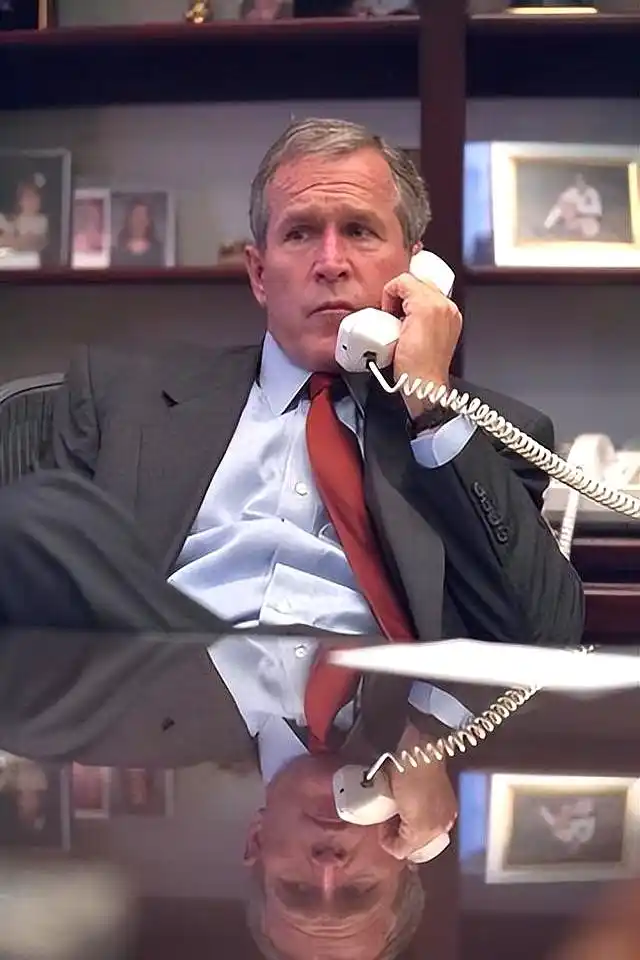How did George W. Bush manage to single-handedly destroy America's golden age?
- CosDream News

- Aug 25, 2025
- 4 min read
On September 11, 2001, the 9/11 attacks shocked the world and became the most profound turning point in U.S. history.
President George W. Bush’s approval rating soared to 92% overnight, setting a historical record.

No one could have predicted that, eight years later, in 2009, when Bush left office, the U.S. would be mired in a financial crisis, with unemployment surpassing 8%.
Two wars had nearly bankrupted the country, and the once "unipolar hegemon" was showing signs of exhaustion.
From being viewed as the leader of the "American century" to facing frustration and failure at the end of his presidency, what exactly did Bush do to squander the "golden legacy" left by Clinton?
As the third-generation eldest son of the Bush family, George W. Bush was born with resources that most could only dream of.
Not only did he have silk bedding in his cradle, but also a pass to the pinnacle of power.

Although Bush’s academic performance at Andover private school was average, frequently oscillating between "C" and "D," he still managed to gain admission to Yale University.
During his time at Yale, Bush’s academic performance remained unimpressive, ranking near the bottom of his class with a GPA that placed him fifth from the bottom.
Nevertheless, he was active in the Skull and Bones society, indulging in pranks and social activities rather than focusing on academics.
In 1968, when the Vietnam War broke out, 22-year-old Bush should have been drafted.
However, through his father’s connections, he joined the Texas National Guard as a pilot, successfully avoiding the battlefield in Vietnam.

During his time in the National Guard, he repeatedly skipped duties and was even found to have a problem with alcohol.
It wasn't until 1992, when his father, George H.W. Bush, lost his bid for re-election, that George W. Bush realized he needed to make something of himself.
At the age of 38, he decided to enter politics, eventually becoming the Governor of Texas and successfully securing a second term.
The 2000 presidential election was one of the most chaotic in U.S. history, with Bush narrowly defeating Democratic candidate Al Gore after a Supreme Court ruling.
In his inaugural speech, Bush declared he would be "a president for all people."
However, no one anticipated that the sudden disaster of the 9/11 attacks would elevate him from being a "controversial president" to a "national icon."
On the morning of September 11, 2001, Bush was attending an event at a Florida elementary school when he received news of the attacks on America.
He quickly responded and began managing the national crisis communications.
When speaking aboard Air Force One, his tone was calm yet resolute: "Freedom has been attacked, and we will defend it."
This successful crisis communication led to Bush’s approval rating skyrocketing to 92%, surpassing the historical records of Roosevelt and Kennedy.
Subsequently, as the U.S. launched the "Global War on Terror," there was almost no division between the Democratic and Republican parties in supporting the war.
Bush became a "strong president" and began advancing a more aggressive foreign policy.
However, the financial pressure brought on by the wars was never given proper attention.
After taking office, Bush introduced a $1.3 trillion tax cut plan, advocating for more money in the hands of the American people.
However, with the outbreak of the wars in Afghanistan and Iraq, the federal surplus quickly turned into a deficit.
In 2001, the U.S. Treasury had a surplus of $236 billion, but just a few years later, the deficit soared to $377 billion.
The initiation of the Iraq war exacerbated this fiscal crisis.
At the same time, in order to maintain war spending, Bush signed legislation allowing investment banks to increase their leverage, which ultimately led to the formation of the housing market bubble.
Between 2000 and 2006, housing prices in the U.S. rose by 124%, but this economic boom concealed the financial crisis brewing beneath the surface.
Corporations moved their production lines to countries with cheaper labor, resulting in a massive loss of manufacturing jobs in the U.S., leaving many workers trapped in unemployment and debt.
In 2006, housing prices began to decline, signaling the onset of the subprime mortgage crisis.
Banks began to default on debts, and in August 2007, BNP Paribas froze its funds, an event that became the trigger for the global financial crisis.
On September 15, 2008, Lehman Brothers declared bankruptcy, triggering a full-blown financial crisis.
The Bush administration was forced to intervene, rolling out a $700 billion bailout plan, but ordinary citizens were left to stand in line for relief.
The U.S. unemployment rate soared, bankruptcies increased, and the number of homeless people on the streets grew, leading to social unrest.
When Bush was asked in his final press conference what his "biggest regret" was, he paused for a long time before saying, "I couldn’t prevent the financial crisis."
However, he did not mention that the root cause of the crisis lay in the financial deregulation he allowed to maintain the war effort and his tolerance for the housing bubble.
The war in Afghanistan became the longest war in U.S. history, Iraq remained in turmoil, and millions of Americans lost their homes and jobs in the financial crisis.
Although Bush returned to his Texas ranch and occasionally mentioned the "necessity of the war on terror," he rarely discussed the financial crisis that caused millions of families to go bankrupt.
Under Bush’s leadership, the U.S. went through the "glory" of the War on Terror but also paid a heavy price for it.
Economic imbalance, lax financial regulation, and loss of public trust all brought the U.S. to the brink of collapse in 2008.
Perhaps history will ultimately tell us that a country’s strength does not rely on war and aggressive diplomacy, but on a stable economy, equal opportunity, and respect for ordinary people.
From the "American Century" in 2001 to the global financial crisis in 2008, Bush’s eight years in office experienced a dramatic transformation from the peak to the mire.
Some have criticized him as the "stupidest president," while others believe he was misled by those around him.
But regardless, history has already written its verdict.





Comments